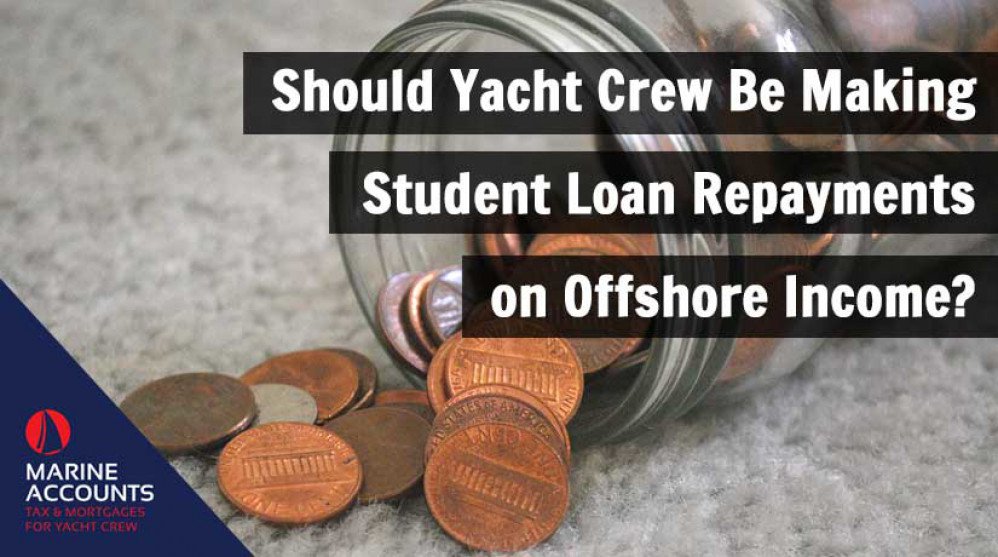Should Yacht Crew Be Making Student Loan Repayments on Offshore Income?
- Authors
-
-

- Name
- Patrick Maflin
-

Image source: https://pixabay.com/photos/pennies-coin-coins-money-jar-15727/
Once again, the time comes that we address an issue on which we regularly find our clients posing questions through online forums, on social media and directly to us.
If you are a UK seafarer with UK student loan debt, you are most certainly not alone if you find yourself asking "when do I need to pay this back?".
The Seafarers Earnings Deduction in the UK can be key to answering this question.
In this article, we clear up all the confusion surrounding whether you are obligated to start paying back your student loan whilst working on a ship overseas.
Read on the find out more, or choose a link from the menu below to jump to a chapter of your choice:
Chapters
- Background
- Plan 1 or Plan 2 Loan?
- How Much Do I Need to Repay?
- How Do I Make Repayments?
- Speak to Us or Comment!
Plan 1 or Plan 2 Loan?
The first question which needs to be answered on your self-assessment tax return in the UK is "am I on a plan 1 or plan 2 loan?”.
On a basic level the two loans differ in terms of the minimum income for which payments will fall due and the length of time for which repayments must be made before the loan is written off.
There are other factors which need to be taken in to account, however as a rule of thumb:
- Plan 1 loans will be written off after 25 years (with the exception of Scotland where the period is 35 years).
- Plan 2 loans will be written off after 30 years across the board.
Determining which loan plan you have taken is also fairly simple.
If you studied in England or Wales and began your course after 1st September 2012, you will be repaying a plan 2 loan.
In any other case you will have taken a plan 1 loan.

How Much Do I Need to Repay?
Your student loan repayments are calculated based on your net taxable income, meaning they are based on the amount of your income which is taxable.
For this reason, your qualification for the Seafarers Earnings Deduction (SED) is most certainly relevant to the amount which you must repay.
Under the current rules, if you declare all your employment income under the Seafarers Earnings Deduction (SED) and have no additional income from investments or other sources, you will not have to begin or continue repaying your student loan.
The reason for this being that your income from offshore work on vessels is accounted for on your tax return as an allowable expense meaning that your net taxable income will be considered to be £0.
You do still have the option to make repayments as it is important to remember that although no payments are due, your loan is still accruing interest every day.
On the other hand, if you do not qualify for the deduction, or you have income which cannot be declared under the SED, you will have to make repayments at set levels of income dependent on which plan loan you have taken.
The repayment thresholds are adjusted annually and run 6th April – 5th April along with the tax year, with figures for 6th April 2018 – 5th April 2019 as follows:
Plan 1
For the 18/19 tax year the threshold for plan 1 repayments is £18,330, meaning you will repay 9% of you taxable income over this amount.
Plan 2
For the 18/19 tax year the threshold for plan 2 repayments is £25,000 with the percentage remaining the same. You will repay 9% of everything you earn over £25,000 this year.

Image source: https://pixabay.com/illustrations/debt-loan-student-mortgage-1376061/
How Do I Make Repayments?
For onshore work, taxed at source through the PAYE system, it is common for the employer to deduct student loan repayments at source.
If they are not doing so, it is advisable that you request they do and keep record of your request.
By doing so you can prove that you have personally made best efforts to make the repayments due and any fine which the Student Loans Company may try to hit you with if this is not done, will be directed to your employer rather than you individually.
However, if like many crew members you find yourself working under a contract of employment for a foreign employer, this will most likely not be the case.
If this applies to you and you have income which will not be covered by the SED, you would be best advised to complete an 'Overseas Income Assessment Form' and return this to the student loans company.
They will respond informing you of repayments owed and with options of how to make these payments.
For a copy of the necessary form or for further advice, contact us today.
Speak to Us or Comment!
If you have concerns about your student loan repayments and whether you are able to claim exemption under the Seafarers Earnings Deduction, we would be happy to review your situation. Contact us today or alternatively, leave your views in the comments section below.
Please feel free to email us directly using the link below:
Click for Professional Tax Advice Whilst Working on a Super Yacht
Liked this article? Try reading: What is the Seafarers Earnings Deduction?
Any advice in this publication is not intended or written by Marine Accounts to be used by a client or entity for the purpose of (i) avoiding penalties that may be imposed on any taxpayer or (ii) promoting, marketing or recommending to another party matters herein.


